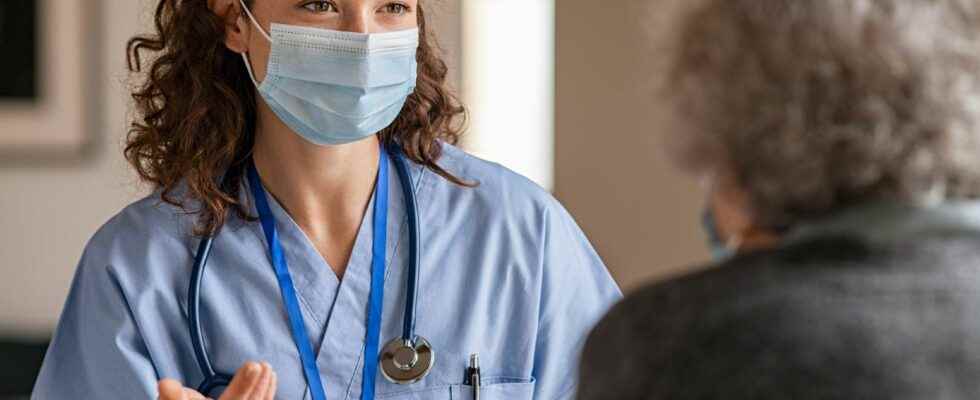Area hospitals are keeping their mask policy in place indefinitely, but London Transit drivers and riders can ditch their face covers when more Ontario mask mandates drop Saturday.

Area hospitals are keeping their mask policy in place indefinitely, but London Transit drivers and riders can ditch their face covers when more Ontario mask mandates drop Saturday.
The shift away from sweeping mask mandates comes amid improving pandemic metrics in the London region, public experts say, as COVID-19 hospitalizations at London Health Sciences Center reach a 2022 low.
“Things are changing. The case counts, the trends that we should anticipate over the summer, this may be as low as we see as we recognize that COVID will always be with us,” said Alex Summers, medical officer of health for Middlesex-London.
“As a population, we’re moving from that emergency pandemic response to an ongoing, sustained endemic response where we’re living with COVID forever.”
Ontario lifted mask requirements in most other indoor public settings this spring. Ontario’s top public health official is not extending the transit and hospital mandates due to improving COVID-19 indicators and high vaccination rates.
The province will still require masks in long-term care and retirement homes, whose highly vulnerable populations are at high risk of severe COVID outcomes.
London Transit won’t require masks after Saturday. Other Ontario transit services, including Toronto’s TTC, also are scrapping requirement, but strongly recommending riders mask up.
But area hospitals – including London Health Sciences Centre, St. Joseph’s Health Care London and St. Thomas Elgin General – will continue to require masks for staff and anyone entering the facilities for the foreseeable future.
As the province began rolling back mask mandates in indoor public spaces in March and April, 13 Southwestern Ontario hospitals said they would stick with mandatory masking “indefinitely.”
The Middlesex-London Health Unit still will require masks in its clinical spaces, like vaccination clinics, after June 11, Summers said, but will let staff in non-clinical programs choose whether to wear one.
“I think it reflects the guidance the rest of the community is living by. We’ve really tried to be consistent with our messaging to the community as well as what we’re doing internally,” he said.
The scientific director of Ontario’s COVID-19 advisory group said he’d have preferred provincial masking rules be extended to help a health-care system still showing “signs of real strain.
“Many individuals in the health-care community, including myself, think that probably the mandates could have been kept in place longer,” Dr. Fahad Razak said Thursday.
“It’s not just about the numbers of patients coming in, it’s this burnout, it’s the health-care worker shortages and just (needing) more time for us to get through this.”
While extending the mandates would give the health-care system some breathing room, Razak said it’s ultimately a judgment call and reasonable people will disagree on the timing.
“At the end of the day, there is no scientific way to say, ‘Today is the day where the mask mandates are lifted, but yesterday it wasn’t safe to do so,’ ” he said. “That clean transition doesn’t happen.”
The number of COVID patients at LHSC dropped to 19 Thursday, the lowest this year by unofficial Free Press tracking. The patient total – every admitted person is tested for COVID-19 – dropped into the low 20s June 1 and has stayed in that range since.
London was ahead of the province in implementing mandatory masks in higher-risk indoor settings. In July 2020, months after the first wave and before vaccines were publicly available, the city’s top doctor made masks a must for public transit, rideshares, cabs and personal service settings, such as salons and spas.
Ontario’s mask mandates in indoor public spaces came in fall 2020.
As other countries with high COVID-19 vaccination rates have rolled back universal mask policies, Ontario following suit is no surprise, said Saverio Stranges, chair of epidemiology and biostatistics at Western University’s Schulich school of medicine and dentistry.
Both Summers and Stranges said masks in indoor public spaces and other precautions may make a comeback this fall if rising COVID-19 case counts strain hospital capacity.
In the meantime, with natural immunity and high vaccination rates, and COVID-19 deaths and low hospitalizations, this summer’s pandemic outlook is about as good as it gets, Stranges said.
“It’s nice that people are now trying to go back to normal life and reconciling with marginal risk, which is extremely low at the present time,” he said. “Vulnerable individuals may need to be extremely cautious, but in terms of the general public, we can relax and enjoy the summertime.”
With files by Megan Stacey and Patrick Maloney, The London Free Press, and The Canadian Press
